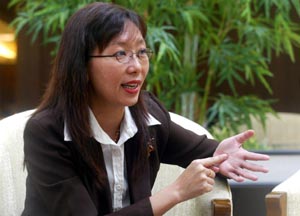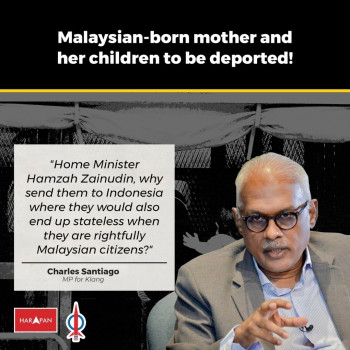 SHAH ALAM, 22 February: The Election Commission (EC) has been urged to clarify the rules and regulations in relation to the Malaysian Abroad Postal Voting System, to show its sincerity in conducting free and fair general elections.
SHAH ALAM, 22 February: The Election Commission (EC) has been urged to clarify the rules and regulations in relation to the Malaysian Abroad Postal Voting System, to show its sincerity in conducting free and fair general elections.
DAP National Vice-Chairman Teresa Kok today called on the EC to name all of the polling stations in overseas missions, and to ensure that they are capable of handling the process in a transparent manner.
Kok pointed out that in countries or cities that have large numbers of overseas Malaysian, the embassies or consulate offices in those areas might face manpower issues. She raised the Consulate-General office in Shanghai as an example. Shanghai has more than 10,000 Malaysians.
Display the list of absentee voters
In January this year, postal voting bylaws were amended to facilitate overseas voting for more groups subject to certain conditions. Overseas voters who register as “absentee voters” are allowed to vote while overseas, provided they have returned to Malaysia in the last five years and stayed no fewer than 30 days in the country.
This condition by the EC has come under heavy fire by critics who say it increases the processing time and would also deny many Malaysians the right to vote.
Kok said that the EC should display the list of absentee voters on its website and update the list every week according to the progress of the registration.
“Public display via internet will help to ensure no large number of absentee voters could be added in the last minute,” she added.
Other flaws in the overseas voting procedures have been pointed out including the exclusion of voters from Singapore, Brunei, Southern Thailand and Kalimantan, who are not entitled to the postal voting facilities.
In addition, overseas postal voters are subjected to a strict one day period during which they must cast their votes at their respective embassies, giving rise to logistic difficulties.

Procedures questionable
Overseas Malaysians who registered as overseas postal voters have been told that they can collect ballot papers from the embassy and consulate-general office prior to voting day. They can then choose to pass the ballot papers back to the Malaysian foreign office to mail back to Malaysia or mail the ballot paper to their friends in Malaysia to pass to the EC.
Kok raised doubts that the ballot boxes will be exposed to risks of being compromised or tampered with while in transit back to Putrajaya for the counting process if the counting process is not performed immediately after ballot closing time.
She also pointed out the absence of observers or polling and counting agents in the overseas postal voting exercise. Several electoral reform groups have already voiced their concerns of such postal ballots may be tampered with during and after voting process.
“The EC must prove the Malaysian Abroad Postal Voting System is above suspicion to ensure transparency and practicability.”
“I urge the EC to cooperate with electoral reform groups to work out transparent and acceptable ways to conduct the voting process for Malaysians abroad,” she said.
Meanwhile, overseas Malaysians who are skeptical about the new absentee voting laws have started a campaign urging voters to fly home to vote instead of relying on postal ballots. The group who run the jombalikundi.com website also pointed out that low cost carrier Air Asia is offering discounts for voters flying home to vote during the general election. -The Rocket



